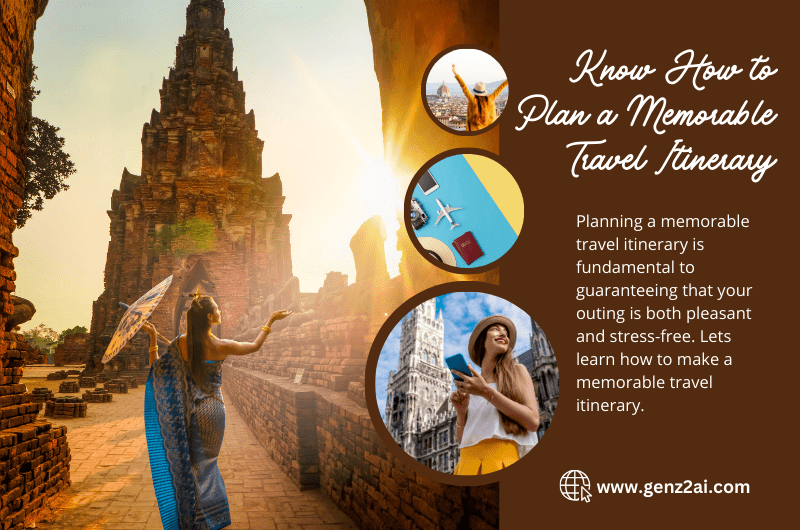Travelling can be a thrilling and remunerating experience, yet focusing on wellbeing and security throughout your journey is important. Whether you’re investigating another city or leaving on a global adventure, playing it safe to protect yourself and your things is fundamental. By being aware of your surroundings and observing a couple of basic rules, you can help guarantee a smooth and charming outing.
1. Keep important documents secure.
One of the main parts of remaining free from even a hint of harm during your travels is to keep your important documents secure. Your passport, identification, and other urgent documents are fundamental for your excursion, so it’s vital to do whatever it may take to protect them from misfortune or burglary.
Keep duplicate documents
Above all else, make duplicates of all your important documents before you depart on your excursion. Keep actual duplicates in a different location from the firsts, like in your baggage or in a lodging safe. You can likewise filter your documents and save computerized duplicates on a secure distributed storage administration or email them to yourself. If your documents are lost or stolen, having these duplicates will make the process of acquiring substitutions a lot simpler.
At the point when you’re making the rounds during your travels, it’s important to keep your important documents secure while progressing. Put resources into a cash belt or travel pocket that can be worn under your dress to keep your passport, identification, and other valuables protected from pickpockets. Try not to convey your documents in effectively open pockets or bags, as this makes it more straightforward for cheaters to take them.
Keep the documents safe
While you’re remaining in accommodations, be aware of where you store your important documents. Utilise the safe in your lodging to store your passport and other valuables when you’re not utilising them. On the off chance that your room doesn’t have a safe, consider utilising a versatile travel-protected or lockable pack to keep your documents secure. It’s likewise really smart to utilise the don’t upset sign on your entryway to dissuade anybody from going into your room while you’re out.
On the off chance that you’re travelling globally, it’s smart to enlist with your country’s embassy or consulate in the destination country. This can help you in the event of an emergency, like a lost passport or other legitimate issues. It’s likewise really smart to find out more about the location of your country’s embassy or consulate in the destination country, so you know where to go in the event of an emergency.
At long last, be aware of who you share your own information with while traveling. Be careful while utilising public Wi-Fi networks, as this can make you more helpless against fraud and different cybercrimes. Try not to share sensitive information, for example, your passport number or credit card details, unless it’s totally essential. It’s likewise smart to try not to convey pointless documents or information with you while you’re out investigating, to limit the risk of losing them.
2. Be alert about your surroundings, Be safe and careful.
While travelling to another destination, it’s important to constantly know about your surroundings. By remaining cautious and attentive, you can assist in keeping yourself no problem at all during your excursion.
Observe the surrounding
One of the primary things you ought to do while showing up in another location is to pause for a minute to get to know your surroundings. Glance around and observe any possible perils or areas of concern. Focus on the design of the roads, the locations of emergency administrations, and the overall climate of the area.
It’s likewise really smart to keep your effects near you consistently. Try to secure your sack or satchel with a solid lash and keep it before you, where you can undoubtedly see it. Try not to place valuables in effectively available pockets or bags that can be handily designated by pickpockets.
While strolling around another city or town, attempt to mix in with local people however much as could be expected. Abstain from wearing flashy jewellery or costly dresses that could make you an object of burglary. Dressing unobtrusively and unnoticeably can assist you in trying not to cause unnecessary attention to yourself.
Be careful about strangers, Be safe
Be careful about outsiders who approach you in the city, especially assuming that they appear to be excessively agreeable or pushy. Pay attention to your gut feelings and go ahead and decline offers of help or assistance, assuming they make you self-conscious. In every case, it’s better to be alert while managing unfamiliar individuals.
Assuming you’re traveling alone, ensure somebody back home knows your itinerary and contact information. Check in with companions or family occasionally to tell them you’re free from any potential harm. Having a support framework set up can give you an added inward feeling of harmony during your travels.
While utilising public transportation, be aware of your surroundings and keep your things secure. Try not to show costly hardware or significant things that could make you an objective for burglary. Remain ready and mindful of your surroundings, especially in crowded or occupied regions where pickpockets might work.
In the event that you’re investigating another city around evening time, stick to sufficiently bright, populated regions and stay away from dim or abandoned roads. It’s generally more secure to travel in groups or with a confided-in sidekick while branching out into the evening. Pay attention to your gut feelings and stay away from circumstances that cause you to feel uncomfortable or risky.
3. Try not to share sensitive information.
While you’re travelling, it’s important to be aware of the information you share with others. This is especially obvious with regards to sensitive information like your own details, monetary information, and travel plans. Try not to impart an excess of information to outsiders or on social media, as this could make you an objective for tricks or robbery.
At the point when you’re making the rounds, be wary about who you share your own information with. Try not to give out your complete name, address, telephone number, or some other distinguishing details to individuals you don’t know well. Assuming that somebody requests this information, considerately decline and continue on.
Don’t share your monetary information with public networks
It’s likewise smart to be wary about sharing your monetary information while traveling. Try not to utilise public Wi-Fi networks to get to your bank accounts or make online purchases, as these networks can be easily hacked. All things being equal, utilise a secure and private network, like a virtual private network (VPN), to protect your sensitive information.
One more important part of remaining free from even a hint of harm during your travels is to be cautious about sharing your travel plans on social media. While it very well might be enticing to share updates and photographs of your excursion, be aware of the information you’re putting out there. Try not to share explicit details about your itinerary, for example, where you’re remaining or when you’ll leave specific locations, as this could make you helpless against robbery or other security risks.
Conclusion
By being careful about the information you share while travelling, you can help protect yourself and your own information. Make sure to utilise your presence of mind and pay attention to your gut feelings. In the event that something doesn’t feel right, decide to be alert. Remain safe and partake in your travels. Know how you can travel eco-friendly.
FAQs
Research Your Destination: Understand local customs, laws, and areas to avoid.
Stay Aware: Be vigilant of your surroundings and personal belongings.
Keep Copies of Documents: Have digital and physical copies of important documents like passports, IDs, and travel insurance.
Register with Your Embassy: Especially for international travel, registering can provide assistance in emergencies.
Use Anti-Theft Bags: Invest in bags with security features.
Avoid Flashing Valuables: Keep jewelry, electronics, and large sums of money out of sight.
Lock Your Luggage: Use TSA-approved locks and consider securing your luggage with cable ties.
Hotel Safes: Utilize in-room safes or front desk safety deposit boxes.
Know Emergency Numbers: Research local emergency contact numbers.
Travel Insurance: Ensure you have comprehensive travel insurance that covers medical emergencies.
Carry a First Aid Kit: Include basic medical supplies and any personal medications.
Local Hospitals: Know the location of the nearest hospitals and clinics.
Choose Reputable Services: Use known and reputable transportation options.
Avoid Traveling Alone at Night: Try to travel with others, especially in unfamiliar areas.
Stay Vigilant: Keep an eye on your belongings and be aware of pickpockets.
Plan Your Route: Know your route in advance to avoid getting lost.


